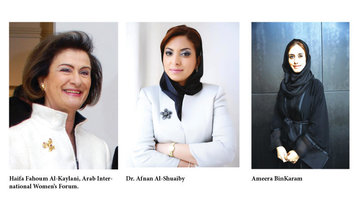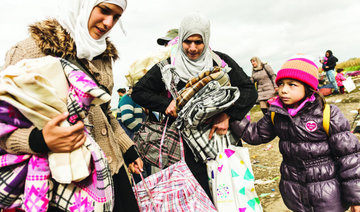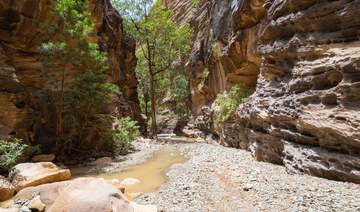LONDON: Development economist Haifa Fahoum Al-Kaylani has a well-deserved international reputation for her commitment to empowering women. She is unusual in having access at the highest levels to governments, business and NGOs globally.
“It is important to work with the public and private sector and civil society to achieve accessibility, progress and peace and provide opportunities for the future,” she said.
As the founder and chairman of the Arab International Women’s Forum she has driven major initiatives to help women in the MENA region achieve equality and parity in the workplace, whether as high flying executives in blue chip companies or hard toiling agricultural laborer. She is constantly working to improve legislative protection for women, open up educational pathways and foster cultural shifts that allow women to fulfil their roles both career wise and in their roles as mothers and nurturers of the next generation.
She takes a positive view of what has been achieved to date and emphasized that it is important to acknowledge progress as “it comes on the back of a lot of effort by women themselves and others in the community.”
She noted: “Over the last year I have seen a lot of progress in the Arab world in women’s leadership. We have seen women assuming high level positions in the private sector, in government and in the judiciary and legislature. Our region is leading the way in technology and women are very much involved in the tech business, benefitting from the innovation and driving new projects and setting up SMEs.”
With reference to the Tech Sector, Al-Kaylani pointed to a recent initiative undertaken in Lebanon.
“In Lebanon the Central Bank has given a guarantee to the commercial banks to grant loans to viable tech projects by young entrepreneurs. This is unusual as the Central Bank would normally focus on running the monetary and fiscal policies but this new measure is to support what they believe can be a vibrant tech sector driven by young enterprise.”
She also pointed to important measures introduced to protect women.
“Looking at the region, we have seen legal reforms, especially in Lebanon, Jordan and Tunisia, to protect women from domestic violence. Egypt also passed a law granting women inheritance rights on an equal basis with men. The UAE is leading the way on maternity rights for mothers and the recently launched Ministry of Happiness and Wellbeing is outstanding.
“Jordan recently appointed its first female judge, Ihsan Zuhdi Barakat, to the Supreme Court.
With reference to Saudi Arabia, she said: “We have seen young women graduating with outstanding accomplishments across all fields of study. They are attaining success at the highest levels including within the Consultative Assembly. They have been moving forward very well in their roles in the economy and in education and it is welcome that they are now able to attend public events in sports and be legally empowered to drive. A lot is happening – all indicators of positive change. Women are keen to play their role in the economic development of Saudi Arabia as outlined in the very valuable 2030 Vision of HRH Crown Prince Mohammed bin Salman.”
While recognizing the significant progress that has been made, Al-Kaylani is clear that there are many challenges that must be faced and overcome.
“The region needs to bridge the gender gap which includes promoting financial incentives and support for women. Finance remains a barrier. We still need to promote technological literacy and improve the infrastructure. We need to focus on capacity building and to build on advocacy to reshape cultural attitudes as we still suffer from certain societal and cultural norms. We need to inspire women’s self-belief in themselves. This is crucially important”, she said.
Al-Kaylani believes that female role models have a major impact in driving change within society that is beneficial to women.
“We need more visible role models. Active, vibrant, dynamic, accomplished role models are extremely important – they help to change mindsets and inspire the younger generations,” she said.
She recalled: “I remember from our many events over the years that young women, especially those from the UAE, would say that Sheikha Lubna Qasimi was their inspiration.
“They all wanted to be like Sheikha Lubna – and she remains a trailblazer. She was the first woman to hold a cabinet position in the UAE and with so many accomplishments.”
She wants to see a culture in which the rights of women are recognized and embedded in law.
“We need to move ahead with reforming the laws in the region to give women equal pay for equal work, more maternity leave and acknowledge the work as homemakers. This is very important to secure the legal provisions that guarantee the rights of women as full members of society,” she said.
Last December, as part of its Young Arab Women Leaders initiative, following on from the successful Young Arab Women Leaders conferences held across the MENA region, AIWF partnered with the Royal Academy of Engineering, the World Bank and PwC, in London, to promote women-led innovation in STEM (Science, technology, engineering and mathematics).
Al-Kaylani, who hosted and chaired the conference, noted the valuable participation of the Saudi scientist Hyat Sindi, who is an Adviser on Science, Technology and Innovation to the President of the Islamic Development Bank in Jeddah.
Al-Kaylani serves as a Fellow of the Harvard Advanced Leadership Initiative 2017, and as a Commissioner on the ILO Global Commission on the Future of Work. Her commitments see her travelling constantly, always with the aim of using her talents to make a difference.
She is clear about what she brings to the table.
“At heart I am a Development Economist through and through. Wherever I see an angle where I can add value, especially as an Arab woman with roots in the region as well as being a global citizen, I participate. I focus on where I see an impact that will create economic growth, development and equality of opportunity – breaking stereotypes. I am also at heart a bridge builder and wherever I see a chance to build better understanding of my region and the Middle East, I am proud to serve,” she said.
Her latest initiative is in the field of Sustainable Agriculture. She has just launched a project to develop a Social Enterprise that will provide an innovative model for sustainable development through agriculture across the MENA region. The project, based in Jordan, will introduce 21st Century technology and innovation to the oldest industry in the world – farming.
As she stated in a recent speech at Harvard: “Many countries in the Middle East are considered both water and food insecure. This problem is exacerbated by climatic changes, scarcity of water resources and the challenges the region is encountering in absorbing the huge flux of refugees from Syria.
“The population of Arab States is expected to reach 487 million by the year 2025 and food production will have to increase by 70 percent in order to sustain the growing population.
“The looming scarcity of water in the Middle East is a huge challenge that requires an urgent response, as access to water is a fundamental need for food security, human health and agriculture.”
The project in Jordan is intended to be scaled-up and replicated across the wider MENA region in the years to come.
At the conclusion of the interview, Arab News asked Al-Kaylani, to describe the qualities and outlook that enable people to create positive change. A positive approach, she said, is key.
“You cannot make any difference in this world or move any agenda forward without a positive, determined, well informed and well researched approach.
“Over my 30-year career, it’s been a learning process for me throughout and also an opportunity to exchange and engage with others – to give and receive. I have always tried to work on common agendas that have an impact on improving peoples’ lives.”
Haifa Fahoum Al-Kaylani: The development economist and women’s rights advocate making a difference
Haifa Fahoum Al-Kaylani: The development economist and women’s rights advocate making a difference
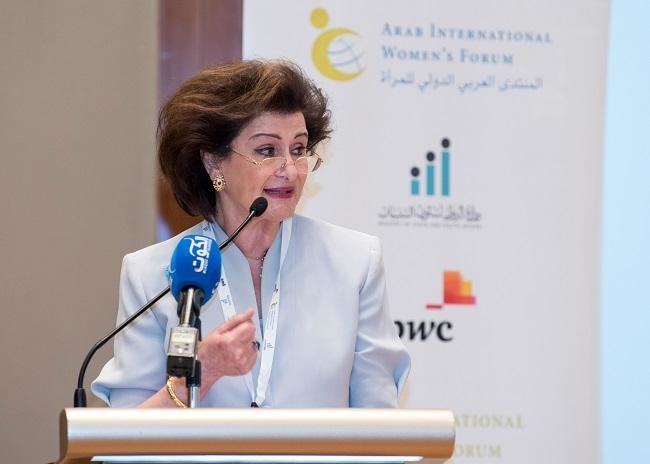
ADNOC to boost production target by 2030

RIYADH: The Abu Dhabi National Oil Co. plans to boost its local manufacturing target for critical industrial products to 90 billion dirhams ($24.5 billion) by 2030 in a bid to strengthen the UAE’s industrial sector and expand local manufacturing capabilities.
ADNOC made the announcement at the “Make it in the Emirates” forum, adding that the new target is part of its expanded In-Country Value program, which aims to drive an additional 178 billion dirhams back into the UAE economy by 2028.
“This expanded initiative will support the UAE’s economic diversification, attract local and international investors, and provide high-skilled private sector jobs for UAE nationals. Additionally, it will stimulate entrepreneurial growth and drive sustainability in ADNOC’s supply chain,” said Sultan Ahmed Al-Jaber, minister of industry and advanced technology, and ADNOC managing director and group CEO.

This expanded initiative will support the UAE’s economic diversification, attract local and international investors.
Sultan Ahmed Al-Jaber, UAE minister of industry and advanced technology
The company said its previous 2027 target of 70 billion dirhams worth of products was “delivered ahead of schedule” following the award of two contracts for metal pipes and valves worth 16.8 billion dirhams to local manufacturers.
The contracts include 8.8 billion dirhams for metal pipes to PM Piping Petroleum Equipment, Ajmal Steel, and the Emirati-owned Al Gharbia Pipe Co.; and 8 billion dirhams for mechanical valves to Samamat, Camtech Manufacturing, Tisco Valves Manufacturing, PTPA, MT Valves and Industries.
ADNOC’s expanded ICV program also aims to provide a micro, small and medium enterprises accelerator program to enable Emirati businesses and local mSMEs to conduct business across ADNOC’s supply chain.
Saudi Arabia’s Sports Boulevard doubles its existing investment fund to $533m
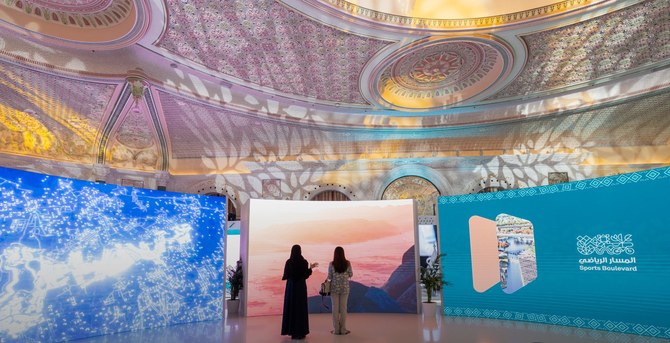
RIYADH: Private sector participation in the Sports Boulevard project is set to increase as the foundation behind Riyadh’s largest linear park plans to double its investment fund to SR2 billion ($533 million).
In a press release, the Sports Boulevard Foundation announced its partnership with Ajdan Real Estate Development Co. and Albilad Capital to add an additional SR1 billion to the private real estate investment fund “Sports Boulevard Real Estate Fund 1.”
This increased funding will be utilized to bolster private sector participation within the Arts District, one of the destinations within the Sports Boulevard project.
The Sports Boulevard Development Co. will continue to hold the majority of units in the fund, while Ajdan Real Estate Development Co. will serve as a developer and primary investor, and Albilad Capital will act as the fund manager.
This partnership underscores the collaborative effort behind the expansion, signifying a strategic alliance aimed at creating a vibrant urban space that enhances Riyadh’s cultural and economic landscape.
The project aims to develop a mixed-use lifestyle destination consisting of residential, retail, office, and entertainment components.
Covering a land area of over 39,000 sq. m. at the heart of the Arts District, the total combined built-up site spans approximately 240,000 sq. m., boasting over 100,000 sq. m. of net leasable area.
The design of this destination draws inspiration from the Sports Boulevard Design Code, influenced by the Salmani Architectural Style. This ensures a dynamic and immersive lifestyle experience for both residents and visitors.
Situated at the intersection of Prince Mohammed bin Salman bin Abdulaziz Road and Prince Turki bin Abdulaziz Al Awwal Road, it offers expansive public spaces, recreational areas, and cycling-friendly tracks.
Covering an area of 184,000 sq. m., the project extends beyond private development parcels, providing ample space for recreational activities and pedestrian-friendly pathways, efficiently linked to the promenade and cycling bridge.
Sports Boulevard, a mega project launched by King Salman bin Abdulaziz in 2019, and supported by Crown Prince Mohammed bin Salman bin Abdulaziz, spans over 135 km on Prince Mohammed bin Salman bin Abdulaziz Road.
It features safe green pathways for pedestrians, cyclists, athletes, and horse riders, connecting Wadi Hanifah in the west to Wadi Al Sulai in the east.
Additionally, the project includes over 4.4 million sq. m. of greenery, open spaces, and up to 50 multidisciplinary sports facilities. It also hosts several unique destinations and investment zones, totaling an area exceeding 3 million sq. m.
Closing Bell: Saudi benchmark index edges down to close at 11,831
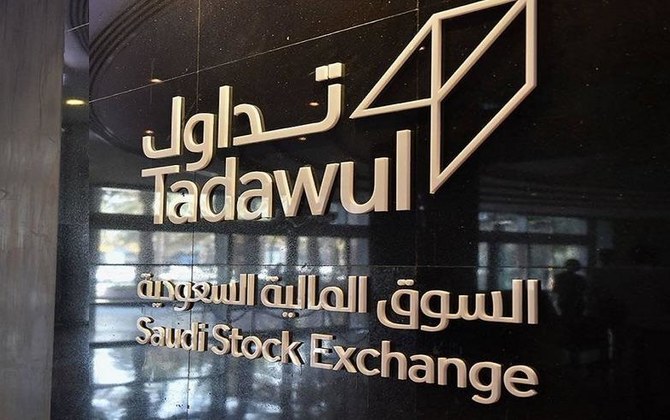
RIYADH: Saudi Arabia’s Tadawul All Share Index slipped on Monday, losing 19.42 points, or 0.16 percent, to close at 11,831.22.
The total trading turnover of the benchmark index was SR5.8 billion ($1.5 billion) as 110 stocks advanced, while 108 retreated.
On the other hand, the Kingdom’s parallel market Nomu also slipped 189.65 points, or 0.71 percent, to close at 26,448.54. This comes as 30 stocks advanced while as many as 34 retreated.
Similarly, the MSCI Tadawul Index also dropped 2.67 points, or 0.18 percent, to close at 1,470.41.
The best-performing stock of the day was Saudi Paper Manufacturing Co. The company’s share price surged 4.89 percent to SR75.10.
Other top performers included CHUBB Arabia Cooperative Insurance Co. as well as Middle East Specialized Cables Co., whose share prices soared by 3.96 percent and 3.46 percent, to stand at SR34.10 and SR32.85 respectively.
On Nomu, Osool and Bakheet Investment Co. was the top gainer, with its share price rising by 9.22 percent to SR48.
Other best performers on Nomu were View United Real Estate Development Co. as well as Al-Modawat Specialized Medical Co., whose share prices soared by 6.53 percent and 6.20 percent to stand at SR79.90 and SR150.80, respectively.
Additional top gainers included Almujtama Alraida Medical Co. and Bena Steel Industries Co.
On the announcement front, Saudi Basic Industries Corp., known as SABIC, received all necessary approvals from relevant authorities to complete the acquisition of its subsidiary Saudi Iron and Steel Co., also known as HADEED, by the Public Investment Fund.
In a statement on Tadawul, SABIC announced that it has satisfied all transaction-related conditions to complete the SR12.5 billion acquisition announced earlier in September 2023.
Furthermore, Saudi Arabia aluminum producer Al Taiseer Group Talco Industrial Co. is listing a 30 percent stake on the Tadawul stock exchange following an initial public offering, setting the final offer price at SR43 per share.
The company is selling 12 million shares and has completed the book-building process for institutional investors, which saw a coverage of 68.5 times the total offer shares, according to Alinma Investment Co., the lead manager and financial adviser to the issuance.
The book-building process for retail investors will run for two days starting on May 28. During this time, they can subscribe to a maximum of 10 percent of the shares. The final share allocation is set for June 2.
Saudi Arabia focused on promoting energy efficiency: top official
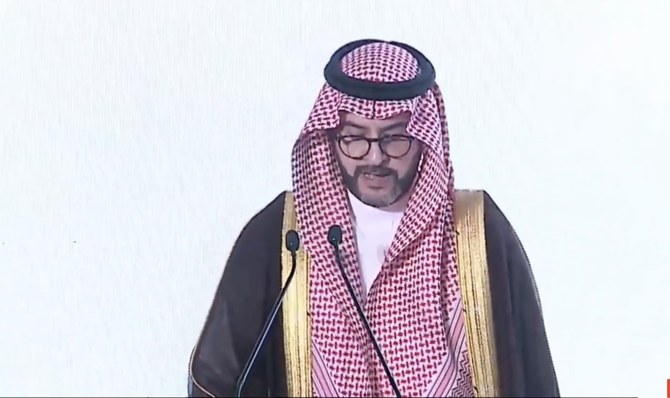
RIYADH: Saudi Arabia’s budding energy efficiency sector has witnessed notable growth, with the number of licensed service providers reaching 55 by the end of 2023, says a top official.
As the Kingdom strives to reduce its carbon footprint, with recently amplified goals to achieve net-zero by 2060, the Saudi Energy Efficiency Center is working to aide the nation in realizing these ambitions, Nasser Al-Ghamdi, the CEO of the center noted.
In his inaugural address at the Saudi ESCO forum, the top executive stressed the entity’s role in raising awareness about energy efficiency. He highlighted that 26 universities nationwide have adopted energy efficiency topics and courses in their curricula.
“Since the inception of the center, we have launched various initiatives that will help in reducing energy consumption,” Al- Ghamdi said.
Among these undertakings, the body has succeeded in launching and implementing more than 200 training programs in the field of energy efficiency, the CEO added.
The executive emphasized that the center has strived to create the necessary ecosystem for suppliers and their beneficiaries in this “promising market” to ensure the quality of energy-efficiency service providers.
He added that this will be achieved through the application of a licensing system for those interested in investing in this field after meeting the technical requirements necessary to provide the service.
Highlighting the role that the fledgling sector is playing in achieving net-zero goals, the CEO said: “The sector, which is considered relatively new, is helping companies and enterprises and buildings in finding solutions to efficiently use energy, including financing and managing solutions and projects. These companies also contribute energy consumption analysis and knowing opportunities for companies to improve their consumption.”
Due to the absence of energy efficiency activities in the commercial sector, one of the highest energy consumers in the Kingdom, accounting for 15.7 percent of total consumption of facilities in the nation, the body launched a pilot project to improve this field.
The initiative aims to improve conditions in the commercial sector by raising business owners’ awareness of opportunities, as implementing energy auditing projects is expected to improve overall efficiency.
Yanbu Royal Commission teams up with Skytower Investments for industrial projects development
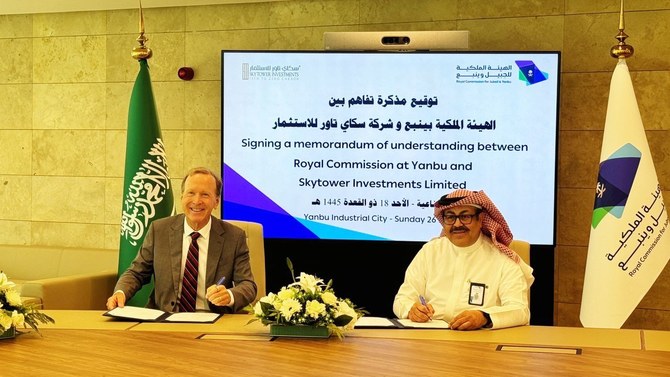
RIYADH: Saudi Arabia’s Yanbu governorate is poised to see the development of several industrial projects following an agreement between its Royal Commission and Skytower Investments Ltd.
The memorandum of understanding, signed by the commission’s CEO, Abdul Hadi Al-Juhani, aims to develop industries in the petrochemicals sector, specialized chemicals, renewable energy, and other manufacturing divisions.
This MoU signing is part of the Royal Commission’s ongoing efforts to attract more local and international investments to Yanbu Industrial City in promising sectors, aligning with the objectives of Saudi Vision 2030 programs.
Headquartered in Riyadh, STI is an investment firm specializing in renewable technology, green manufacturing, supply chain, and green power production.
“This is a result of significant development over the past nine months by both teams paving the way for more international manufacturing and localization projects landing in Yanbu,” Skytower said in a tweet on X.
It added: “This agreement will pave the way for more international manufacturing and localization projects landing in Yanbu, an industrial heartland with complete industry infrastructure and extensive manufacturing experiences.”
In April, STI signed a four-party joint agreement with Chinese automaker Chery Automobile Co., the Ministry of Investment, and the National Industrial Development Center.
This collaboration, driven by Saudi Arabia’s Vision 2030, signifies a crucial step toward future economic opportunities and the well-being of the Saudi people.
In August 2023, the Kingdom’s untapped southern region took a significant step toward welcoming international travelers.
Cruise Saudi and the Royal Commission for Jubail and Yanbu signed an MoU to unlock the region’s tourism potential. This strategic partnership was aimed at positioning the southern region as a captivating tourist destination, fostering growth in the travel sector and contributing to the region’s economic advancement.
Formalized during the MASAREB ceremony held in Jazan, the agreement encompassed a spectrum of efforts, from knowledge transfer to mutual alignment on ventures aimed at establishing the destination and yielding a positive local impact.
STI is a global partnership between NGOs, green businesses with advanced eco-friendly technology, sustainable manufacturing, and Saudi’s national sustainable economic development authorities.
Their aim is to develop practical plans for industry decarbonization, economic revitalization, technological advancement, and carbon-neutral technology.


